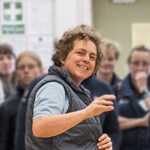Search - All Results
1321 - 1330 of 1809 results
-
RVC study uses computer optimization to show ostrich gait in detail never seen before
Study published in the Journal of the Royal Society Interface, focused on the mechanics and the muscles used by ostriches, the world’s fastest two-legged animal, as they walk and run -
NSS Success - RVC ranks in top 10
RVC degrees ranked highly in NSS and THE surveys - 100% overall satisfaction for biosciences and nursing courses -
RVC ranked highest... again!
The RVC is once again the most highly ranked in London for its student experience in the latest Times Higher Education (THE) Student Experience Survey 2017. -
RVC first in the UK for overall student satisfaction
The RVC has been ranked by its students as providing the best quality courses of all UK universities in the National Student Survey (NSS) -
The RVC gets fantastic results in 2016 Student Experience Survey!
RVC voted number one university in London in the Times Higher Education (THE) Student Experience Survey -
Gastric bloat: 80% survival of surgical cases shown in VetCompass study
An RVC-led epidemiological study involving dogs from across the UK has blown the myth that gastric bloat is almost always a death sentence for affected dogs. -
RVC ranked in top three for the third year in a row
For the third year in succession the RVC is ranked as one of the top three vet schools in the world by QS World University Rankings. -
Leading veterinarian awarded prestigious National Teaching Fellowship
An RVC professor has been honoured with a national award in recognition of her substantial national and international contributions to education and pedagogy. -
New research reveals frogs’ impressive ability to jump at an extreme range of take-off angles
Research led by the RVC shows how frogs are able to achieve a wide range of jump angles, from nearly horizontal to almost vertical -
Reconstruction of ancient chromosomes offers insight into mammalian evolution
What if researchers could go back in time 105 million years and accurately sequence the chromosomes of the first placental mammalWhat if researchers could go back in time 105 million years and accurately sequence the chromosomes …










